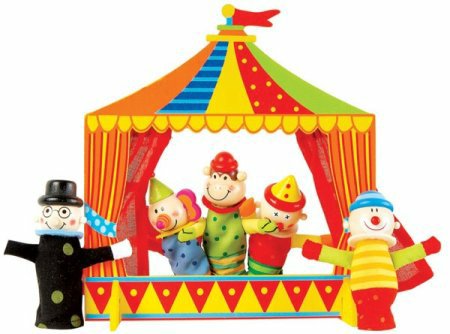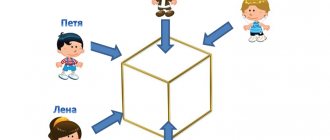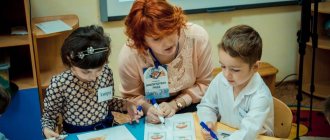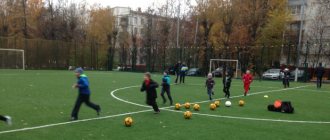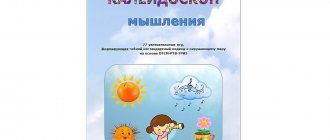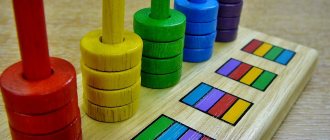MAGAZINE Preschooler.RF
Consultation for educators “Integration of theatrical activities in preschool educational institutions”Theatrical activities in kindergarten can organizationally permeate all routine moments, be included in all classes, in the joint activities of children and adults in their free time, and be carried out in the independent activities of children. Theatrical activities can be organically included in the work of various studios and clubs; products of theatrical activities (stage plays, dramatizations, performances, concerts, etc.) can be included in the content of holidays and entertainment.
Theatrical play in the classroom. During classes, the teacher includes theatrical play as a gaming technique and a form of teaching children. Characters are introduced into the lesson to help children acquire certain knowledge, skills and abilities. The game techniques used in the classroom make it possible to explain this or that material to children more clearly; They are attracted by their unobtrusiveness, lack of strict regulation of activities, and excessive dryness in the presentation of the material. So, Parsley, who does not know how to count, comes to visit a math class, and the children explain to him the rules of mathematics; During classes on getting to know the world around us, funny Carlson is happy to learn the secrets of caring for plants with children, and animal dolls put on a show on why we need to protect all living things.
The playful form of conducting classes helps to emancipate the child, creating an atmosphere of freedom and play. At the same time, the game used in the classroom is for the most part a didactic, that is, educational game, and cannot replace the independent play of children in terms of the educational and developmental effect that it gives. Therefore, researchers consider it unacceptable to blur the lines between independent and educational play: each of them has its own place and meaning in the life and activities of a child.
Free joint activities for children and adults. This is a joint activity during a walk, outside of class. This includes playful walking situations and organizing games in playrooms. Reading fiction followed by acting out plot episodes outside of class during the day, drawing games on a free topic, construction games with dramatization. All of these types of play activities influence children’s independent play and are an impetus for creative thought and ideas that require implementation.
Theatrical play in children's independent activities. It is known that independent play of preschoolers arises under the influence of impressions received from the environment. Therefore, for the emergence and development of full-fledged play activity, it is necessary to nourish children’s impressions. The independent play of preschoolers in kindergarten is influenced by two noun factors: regulated activities of adults with children and free activity of children and adults.
The influence of regulated classes is manifested in the reflection of children’s independent activities of the content and material that are used in the process of teaching children. These could be stories, stories, fairy tales that interested children so much that they wanted to embody them in independent play. Children can get carried away by some of the experiments carried out in class, the actions of mechanisms, etc.
In the free joint activities of children and adults, the greatest impression on children is made by performances (puppet, dramatic) performed by adults and older children. Children want to relive the stories that interest them once again, so they play them out in their games, going through the story lines again, transforming, varying and building them in their own way. Children repeat the story of the kolobok, distribute roles in the game of Teremok, strictly observing the rules of the order in which a particular character appears. If independent play has a high level of development, then children come up with new characters in addition to previously known ones.
Holidays and entertainment make a great impression on children. Vivid impressions, violent feelings and experiences push children to embody what they see in play, both immediately and delayed in time. Children act out the songs performed at the festival, skits staged, and games played. Independent children's games reflect characters and plots that excite children. Thus, children often play Snow Maiden and Father Frost, creating a new world of the New Year holiday in the playroom. They repeat the plots played out by adults on Trinity Sunday; they weave wreaths on the street and exchange them.
Vivid stories, games, round dances, learned in joint free activities of children and adults, in games and activities, also contribute to the emergence of independent theatrical play for children. Preschoolers are happy to repeat familiar games in independent activities, their number in the play repertoire is growing, and the opportunity to choose them appears, which diversifies the play activity itself.
Walking provides great opportunities for children's playful development. Here, children's initiative is not constrained by the regulatory environment. Children are given freedom of movement, space to play, and the opportunity to use paraphernalia and costume elements. The teacher can interest children in an unexpected play situation (a wolf peeks at a hare from behind a bush; a Mashenka doll slides down a hill on a sled; a toy zoo is located in a clearing), or dramatization of episodes from a familiar fairy tale. All this has an emotional impact on children and is then transferred to independent games.
Not everything they see and hear within the walls of the kindergarten and beyond has a big impact on children. Children only transfer into independent play what excites their imagination with bright, exciting images and makes them experience strong feelings. It aroused interest. Gave me food for thought.
Of no small importance is the ability of the teaching staff to draw the attention of parents to the problems of their own children. To do this, it is necessary to involve parents in preparing and holding holidays, entertainment, and games. In the process of purposeful work, parents will become imbued with concern for their own children and will be attentive to children's play as an urgent need for the child, and will try to organize games at home.
The above allows us to conclude that independent creative play can develop if:
- practitioners are aware of the important role of independent play in a child’s life
- In the educational process of preschool educational institutions, play occupies a leading position among other types of children’s activities.
- children are given time and space for amateur games
- an environment is created that nourishes children's games with bright artistic images and plots
- educators are models of creative behavior, have experience in theatrical performances, and have artistic qualities
- an adult-child community is created (teachers-children-parents), which lives by common interests, implements creative projects, and makes plans for future communication.
| Next > |
“The whole world is a theater, and the people in it are actors,” says the classic.
Children's theaters have always been a wonderful place for leisure for the whole family. Theater has a certain influence on any of us, directly or indirectly. And at every age we perceive theater differently.
Theatrical activity is the most common type of children's creativity. It is close and understandable to the child, it lies deep in his nature. From the point of view of a humanistic position, all children are gifted, and the teacher’s task is to reveal the talent of each child, give him the opportunity to believe in himself, and feel his success. The development of theatrical activities in preschool educational institutions and the accumulation of emotional and sensory experience in children is a long-term work. This work is carried out throughout the entire period while the child attends preschool.
Experiencing life through emotions
A unique period of a person’s life is childhood, the time of personality formation. It is in childhood that a special role is assigned to theatrical activities. Our children are provided with a wide variety of experiences of life. These are feature and animated films, various computer games, colorful educational toys, and all kinds of entertainment.
What about the theater? Has theater really lost its relevance and significance in the modern world and faded into the background?
In no case! Theater was, is and will be the best emotional school of life. He is also a source of information about the world, a powerful stimulus for the thought process and the formation of spirituality.
Theater has many functions: aesthetic, entertaining, communicative, socializing, gaming... But the most important, especially for children, is the cognitive function. Role-playing knowledge of the world, mastering the skills of coexistence with peers and adults, partnership skills, the ability to act in the circumstances offered by life, learning social experience - all this happens through images, colors, sounds, and action.
Children are the best spectators because they do not hide their emotions. Children's theater directors are, as a rule, good teachers. When creating performances, they skillfully and consciously use a similar feature of child psychology, making the viewer a participant in the performance. Unique in this sense is the art of puppet theaters, where puppets play for children, and children communicate with the dolls. This is the closest relationship, because the toy and the child are inseparable.
Your child is a great artist. Information and emotions received in the theater broaden children’s horizons, their emotional range, and create a need to tell friends and parents about the performance, to share their joy or experiences with literally everyone. This undoubtedly contributes to the development of speech, the ability to conduct a dialogue and convey one’s impressions in a monologue form. This is the case when we are talking about a child - a spectator.
But children are also brilliant actors by nature, living with feelings and emotions that are not limited by growing up. And if the child himself takes part in theatrical productions: at home, in kindergarten, at school, in a theater studio, then the list of precious acquisitions lengthens significantly. Along with well-developed speech and a broader outlook than their peers, memory is trained (memorizing text), the child becomes liberated, becomes more sociable, and takes responsibility for the business, for himself and his partner. We can talk endlessly about the role of theater in a child’s life
Therefore, dear parents, get ready, dress up, take your children and go to the theater. Enroll your precious children in theater studios and clubs. You will never regret it. At the very least, your child will become a great artist.
For the first time to the theater...
Go to the theater with your child. It would seem, what could be simpler? We buy tickets, put on a formal suit - and now we are sitting on the velvet seats of the stalls... In fact, everything is not so simple. A trip to the theater for a child is a huge holiday, an infrequent event that will be remembered for a long time, and we must try to ensure that the child is not disappointed. It would be good to find out in advance about the performance you are going to see: read reviews, ask friends. A child may protest if he sees an unusual or too extravagant interpretation of his favorite fairy tale, and poor acting and tasteless scenery can instill a dislike for the theater for many years. Make sure your child is dressed comfortably so that you don’t have to spend half an hour stripping him of thirty-three warm clothes in a crowded foyer (and then putting them back on). You can choose stylish but functional clothes that will make your child look elegant, but won't cause too much trouble.
Rules of conduct in the theater
1. Tell us in advance about the theater and what it is.
2. Dress your child festively. The association “theater - holiday” should be firmly rooted in the child’s memory. In addition, when dressed festively, we behave more gallantly and restrainedly.
3. Take your child to the toilet before the performance starts.
4. Under no circumstances give your child a phone or tablet during the performance.
5. Make sure you have water, tissues or wet wipes on hand.
6. Children often cannot sit without a snack. If you take food with you, don't let it be crispy cookies. To avoid rustling the wrapper or paper, first place the cookies in a small bag.
Theatrical games
Work on the development of theatrical activities is carried out constantly. When playing theater, a child strives to express all his experiences and impressions in action. Bright costumes and figurines of fairy tale heroes, hats, and masks help him in this. This attracts children, first of all, with the opportunity to dress up, which means to change, transform into their favorite characters and act on their behalf.
The importance of theatrical activities cannot be overestimated. Theatrical games contribute to the comprehensive development of children. In addition, these games require determination, hard work, and ingenuity. And how children’s eyes light up when an adult begins to read aloud, highlighting the character of each character with intonation.
Theatrical games always delight children and often make them laugh. The guys laugh when the characters laugh, they feel sad and upset with them. Children voluntarily accept and appropriate the characteristic traits of the character. The variety of themes, means, and emotionality of theatrical games make it possible to use them for the purpose of educating the child’s personality.
Parents can initiate the organization of a variety of theatrical games at home. These can be games - fun, games - dramatization while singing, listening to fairy tales and then acting them out. Such joint entertainment can play a big role in creating a friendly, trusting, creative atmosphere in the family, which is important for strengthening family relationships. And if you also organize joint activities to make toys or dolls, then the child’s joy will know no bounds. In any case, joint theatrical and play activity is a unique type of activity. Everyone is equal in it: the child, the teacher, mothers, fathers, grandparents. By playing with adults, children learn valuable communication skills.
By doing theater with children, we will make their life interesting and meaningful, filling it with vivid impressions. And those skills, knowledge and ideas that children will receive in theatrical games, they will be able to use in everyday life.
Thus, theatrical activities are the most important means of developing empathy in children, i.e. the ability to recognize a person’s emotional state by facial expressions, gestures, intonation, the ability to put oneself in his place in various situations, and find adequate ways to help.
